Receiving a grant from Berks County Community Foundation marks an exciting milestone in your organization’s journey. It’s more than just funding – it’s a boost of confidence in your vision and the impact you make in our community. Let’s walk through what happens next and how to make the most of this opportunity.
First Things First: The Grant Agreement
Before the fund is distributed, there’s one crucial step that must be taken: completing your grant agreement form. This document outlines the responsibilities between your organization and the Community Foundation, ensuring clarity and setting expectations. You’ll need to submit this through our third-party online portal within 30 days of receiving your email offer.
Sharing Your Success
Once your grant agreement is squared away, consider sharing your achievement with the community. Here’s how to do it effectively:
- Celebrate Your Team
Take a moment to acknowledge the dedication and hard work that brought you here. Your team’s commitment deserves recognition, and this grant validates their efforts.
- Tell Your Story
Consider sharing your journey and plans across your communication channels. Whether that is through your website, social media, or newsletter, let your supporters know about this exciting program. It’s about inspiring others and showing the positive changes happening in our community.
- Give Credit Where Credit is Due
When sharing news about your grant, please include proper acknowledgment of the funding source. Use the following format:
“Support for this project was provided by the [XYZ Fund] of Berks County Community Foundation.”
Click here to download a comprehensive resource to help you navigate this journey. Click here to find detailed guidelines for using our organization’s name and logo, templates for various communications and more!
- Looking Ahead
This grant is just the beginning. We’re excited to see how your project develops and the positive change it brings to our community. Remember, our team is here to support your success every step of the way.
Have specific questions about promoting your funding? Email me at ericac@bccf.org.
Each year, applications for our scholarships open on January 1st; applicants must be submit their applications by 11:59 PM on March 1st. Please note that applicants cannot edit or submit applications after the deadline. To ensure a fair process, we are unable to make exceptions to the deadline.
These scholarships are open to students from all high schools across Berks County and of all ages. Want some inspiration? Read our blog, “Embracing a New Chapter: A Retiree’s Journey Back to School”. Loretta Boyd received the Community General Hospital Foundation June A. Roedel Healthcare Scholarship, just one of the many scholarships for which you can apply.
To view a list of all of the scholarships we have to offer, click here.
Thanks to the incredible generosity of community members who established and contributed to scholarship funds since our founding, we awarded approximately $747,000 in scholarships in 2024!
If you have questions while completing your application, visit our FAQ section for helpful tips. You can also email us at scholarships@bccf.org or call 610.685.2223.
Kim Sheffer, Lifelong Learning Program Officer, manages our scholarships. Kim oversees 130 scholarship opportunities and education-related grants. With a decade of experience at the Reading Public Library in roles ranging from Children’s Library Assistant to Senior Outreach Coordinator, Kim has a deep understanding of our community needs. To learn more about Kim’s role, take a look at the video below!
Retirement often signifies a time of reflection and a well-deserved break from decades of hard work. But for some, like Loretta Boyd, retirement is merely the beginning of a new chapter. At 78, Loretta decided to trade in her retirement for a new academic adventure. Loretta’s decision to return to school wasn’t a spur of the moment decision. It was carefully considered, influenced by her daughter, Kristin, and her grandson, TJ.
Loretta had retired from a career that included roles as a Nurse Manager and a Director of Obstetrics, but she wasn’t ready to fully retire yet. One day, when Loretta planned to run errands with Kristin and TJ, they took a detour to Reading Area Community College (RACC). Loretta decided to enroll as a student majoring in healthcare in Medical Coding and Billing. “Having retired after 50 years as a Registered Nurse, I decided to transition into another healthcare field. I feel I still have much to give to the medical field in another capacity such as coding and billing”, Loretta explained. Returning to school was not as simple as filling out an application and enrolling in classes. Loretta faced some challenges that included financial concerns, applying for scholarships and returning to the classroom as a non-traditional student.
“Loretta’s decision to go back to school is a reminder that learning knows no age limit. The decision to pursue education after retirement exemplifies the community of life-long learners that the Community Foundation proudly supports; said Kim Sheffer, Lifelong Learning Program Officer at the foundation.
The Community General Hospital Foundation June A. Roedel Healthcare Scholarship Fund provides financial support to residents of Berks County who undertake or further their career in healthcare by providing scholarship funds for their educational expenses. In 2024, this fund granted over $93,000 in scholarships including Loretta’s. Residents of Berks County are eligible to apply if they will be attending an accredited educational institution pursuing a career in healthcare, with a career goal of fulfilling a local community need involving patient care.
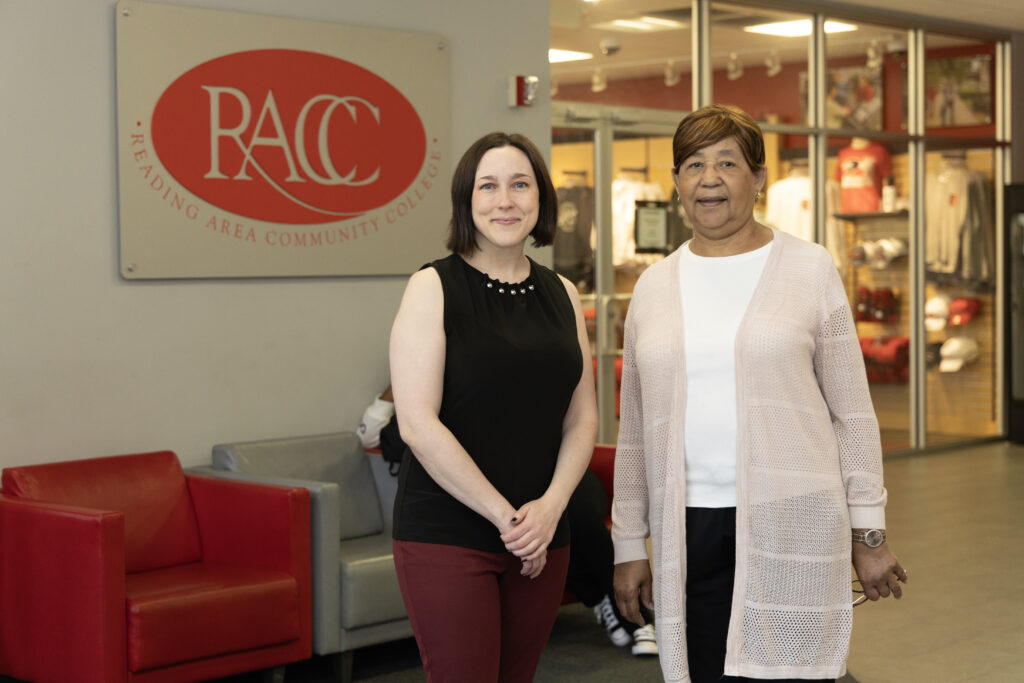
Going back to school for Loretta brought new challenges that she was not expecting. At times, she would lose focus and would feel discouraged. She found support in her bible study group and in the book titled Oh, the Places You’ll Go! (Dr. Seuss. 1990), given to her by her family. On each page of the book, a family member wrote a note to remind her of her goals. Loretta’s career goal is to find employment in either a hospital or physician’s office.
She says, “By being a medical coding specialist, I will be able to ensure that the patient medical records are complete and accurate when being sent for payment. Having accuracy in the records will assist the revenue cycle in the hospital or physician’s office. lt will also decrease the need for repeat submissions to insurance companies.” Loretta achieved Dean’s List while taking four courses each semester with an anticipated graduation date of May 2025.
To download our full 2024 Annual Report, please click here.
The Fleetwood Area School District’s Nature Center Restoration project is not just focused on creating a beautiful outdoor space on school grounds. This student-led restoration of an outdoor learning environment will provide access to environmental education opportunities, connecting students to nature and their surrounding community.
The outdoor learning environment will serve as a classroom complete with picnic style tables, providing students with hands-on experiences to spark a lifelong interest in environmental stewardship. The project leaders plan to create signage to identify key educational aspects of the Nature Center including tree and animal species identification and watershed information. They aim to help native plants and birds reclaim portions of their habitat by building floating island structures and birdhouses.
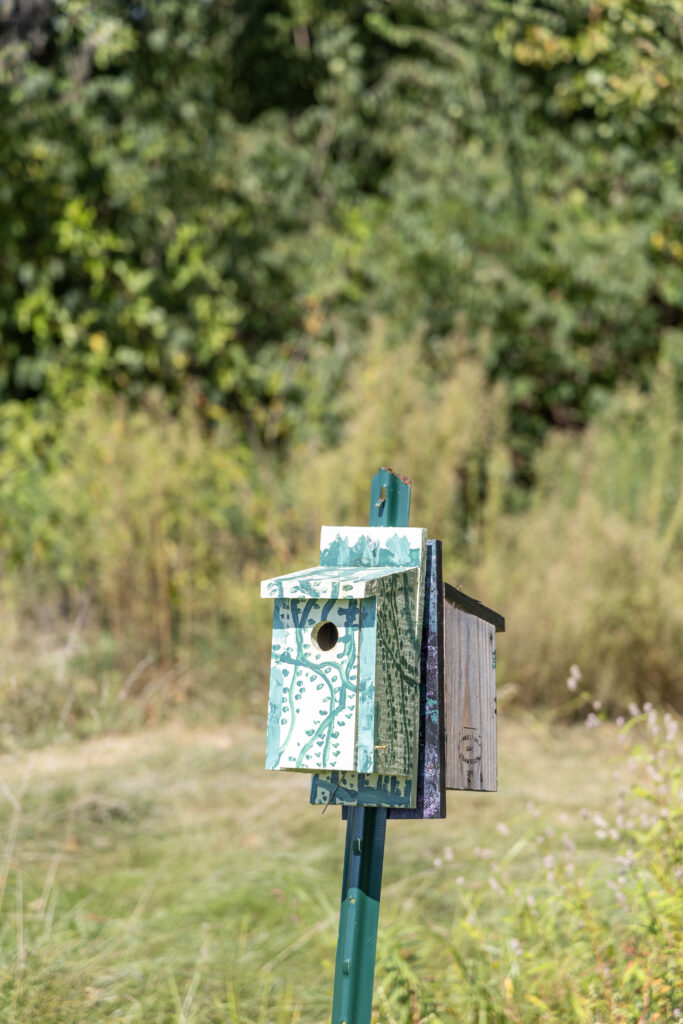
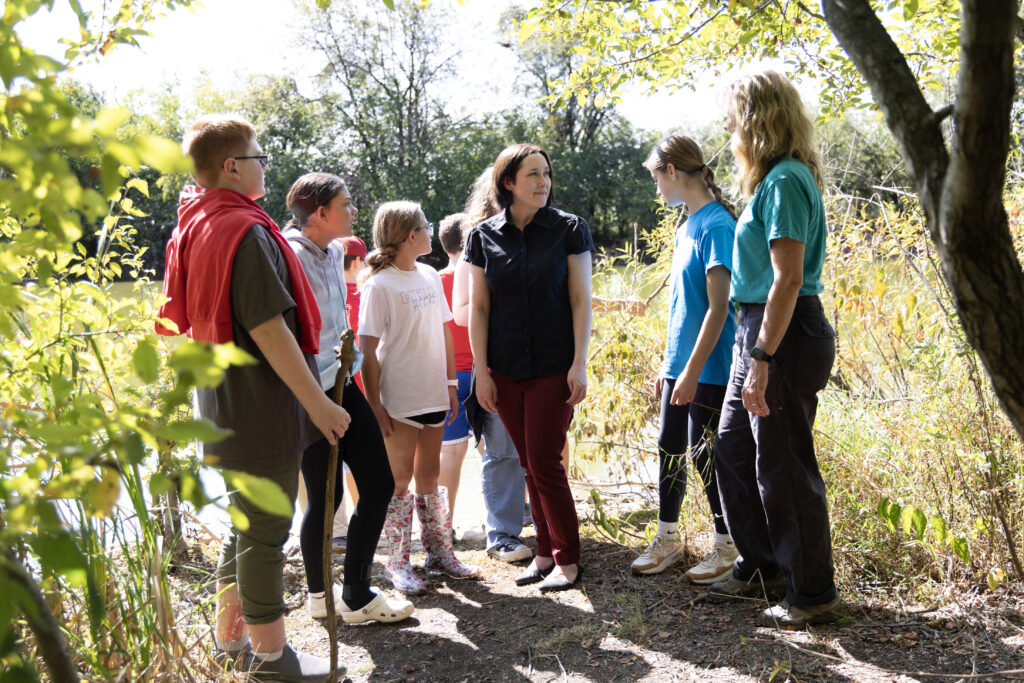

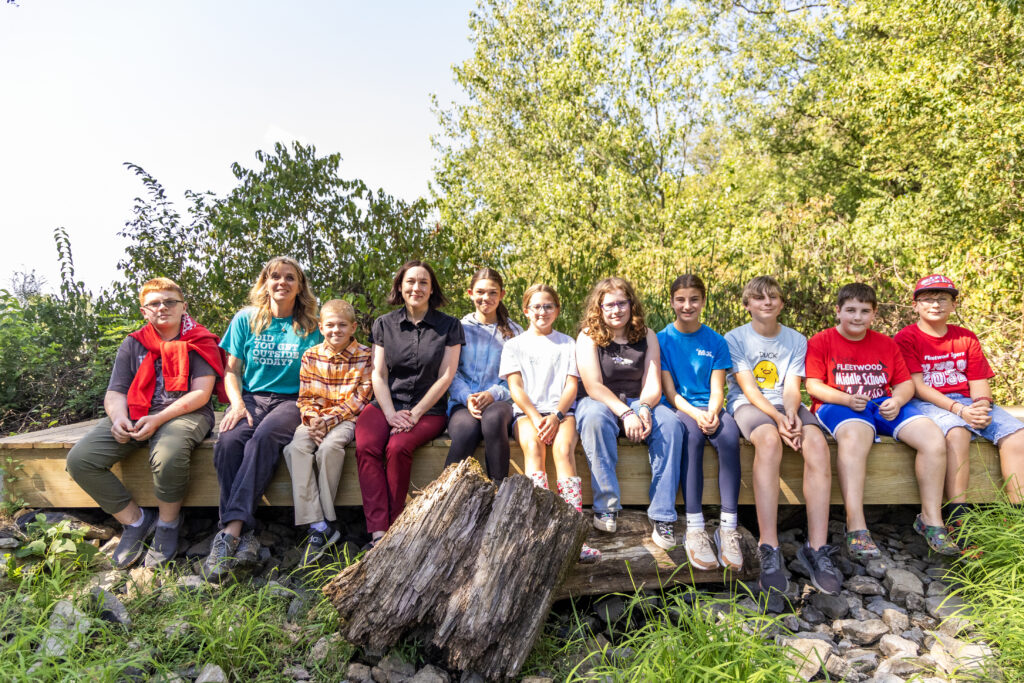
During a recent visit, we were fortunate enough to witness not only a baby blue heron basking in the sun, but also the pride and excitement from the students who have worked so hard to get things started at the Nature Center. After extensively researching native plants, students selected species such as spatterdock, duck potato, and swamp milkweed to add to the land and water. It was truly inspiring to see the students channel their creativity and innovation into a project that will have such a positive impact on the community.
The goal of the project is to help students gain skills in leadership, teamwork, communication, problem solving, and project management. What makes this project particularly special is its student-led approach. The Fleetwood Area School District is committed to empowering these students in grades 5-12 by allowing them to lead the efforts.
“Whether it is a fifth-grade teacher demonstrating the water cycle for his/her class, or the AP Biology students visiting the pond to assess habitat health by chemically testing the quality of the pond water, it will be an outdoor classroom that will be used in a wide variety of ways,” Dr. Natalie Lytle, Director of Curriculum and Assessment at Fleetwood Area School District said about the impact the classroom will have.
This hands-on experience will also instill a sense of responsibility and ownership among students. They will witness firsthand the impact of their efforts, making the lessons learned in the classroom come alive in a real-world context.
Funding for this project came from the Teacher Mini-Grants Fund of Berks County Community Foundation, which provides grants up to $500 for Berks County K-12 school employees to support innovative classroom projects. Applications are now being accepted until December 1 for the 2024-2025 school year. For more information about the fund, please click here.
Reading, PA – October 9, 2024 – Berks County Community Foundation is pleased to announce the conclusion of its 3rd quarter grant cycle, which has successfully distributed vital funding to local nonprofits and initiatives dedicated to improving our community.
In this quarter, the foundation awarded grants to a diverse range of projects focusing in areas of environment and energy, education, health and human services, arts and culture, and neighborhoods and economic development; supporting the impactful work of local organizations that improve the lives of Berks County residents.
These numbers are a testament to the Foundation’s commitment to its mission to promote philanthropy and improve the quality of life for the residents of Berks County.
- Q3 total grants awarded: 549
- Q3 total dollar amount awarded: $1,459,851
- Q3 number of organizations impacted: 275
“Grants awarded are made possible by generous donors who give back to the community they love,” stated Molly McCullough Robbins, Vice President for Philanthropic Services.
Moving forward, community members are invited to join the Community Foundation in sparking change. Here are two ways to get involved:
- Give to an Existing Fund: Your contributions can help sustain the important work of established funds addressing specific needs within Berks County.
- Create Your Own Fund: Whether you want to honor a loved one or support a particular cause or organization, the Foundation can help you to create a fund that reflects your passions and philanthropic goals.
For more information on how to give or create a fund, please visit www.bccf.org, email Molly McCullough Robbins at mollyr@bccf.org, or call (610) 685-2223.
About Berks County Community Foundation
Berks County Community Foundation is a nonprofit corporation serving as a civic leader for our region by developing, managing, and distributing charitable funds to improve the quality of life in Berks County, PA. More information is available at www.bccf.org.
###
The board room at Sinking Spring Public Library (SSPL) was recently transformed into an all-day workshop for anyone interested in learning the traditional Scottish craft of spinning yarn. SSPL Director Wenonah Riegel organized and instructed this unique class that featured a traditional Scottish spindle called a Dealgan.
Riegel enjoys spinning, knitting, and crocheting, and has been honing her craft for 34 years. She started spinning when she worked at Hopewell Furnace National Historic Site, where she was responsible for costume interpretation in one of the tenant houses. She has also demonstrated various traditional crafts including spinning and natural dyeing at Daniel Boone Homestead, Warwick Park, Hay Creek Festival, the Mouns Jones House, and the Birdsboro Community Center.
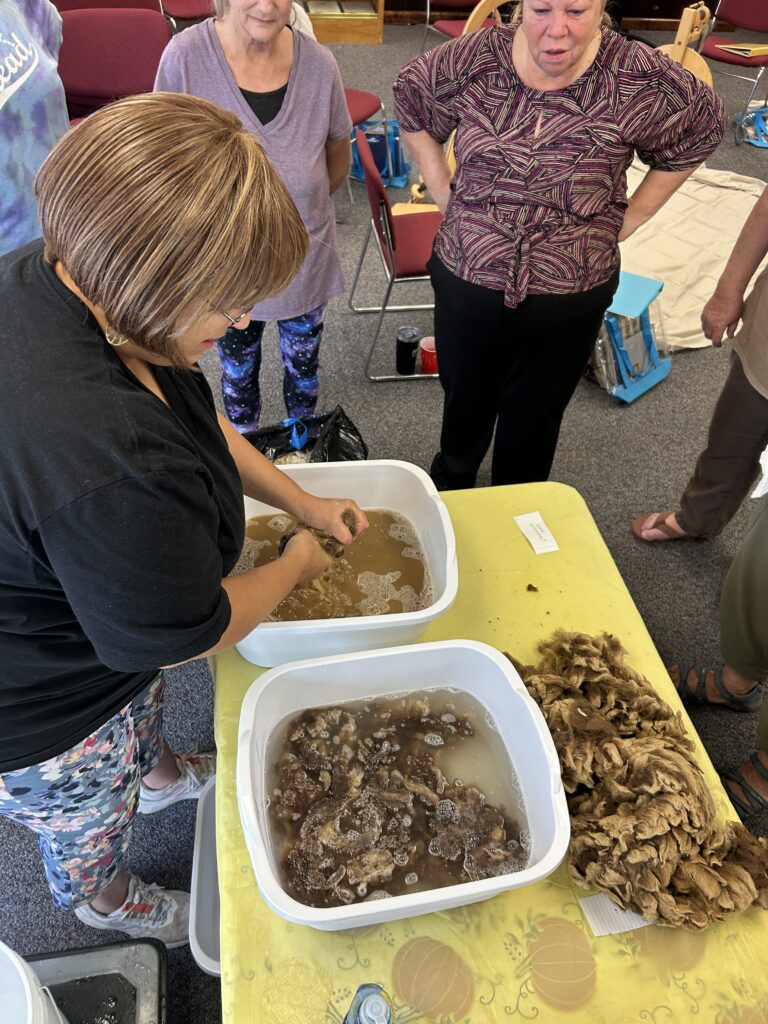
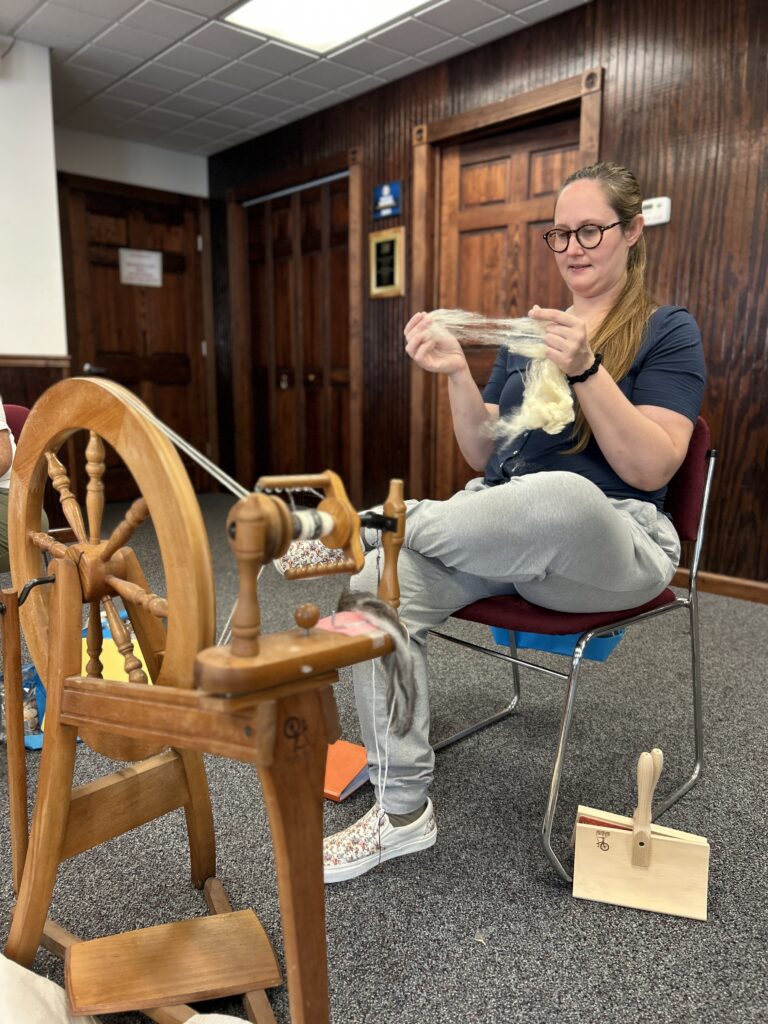
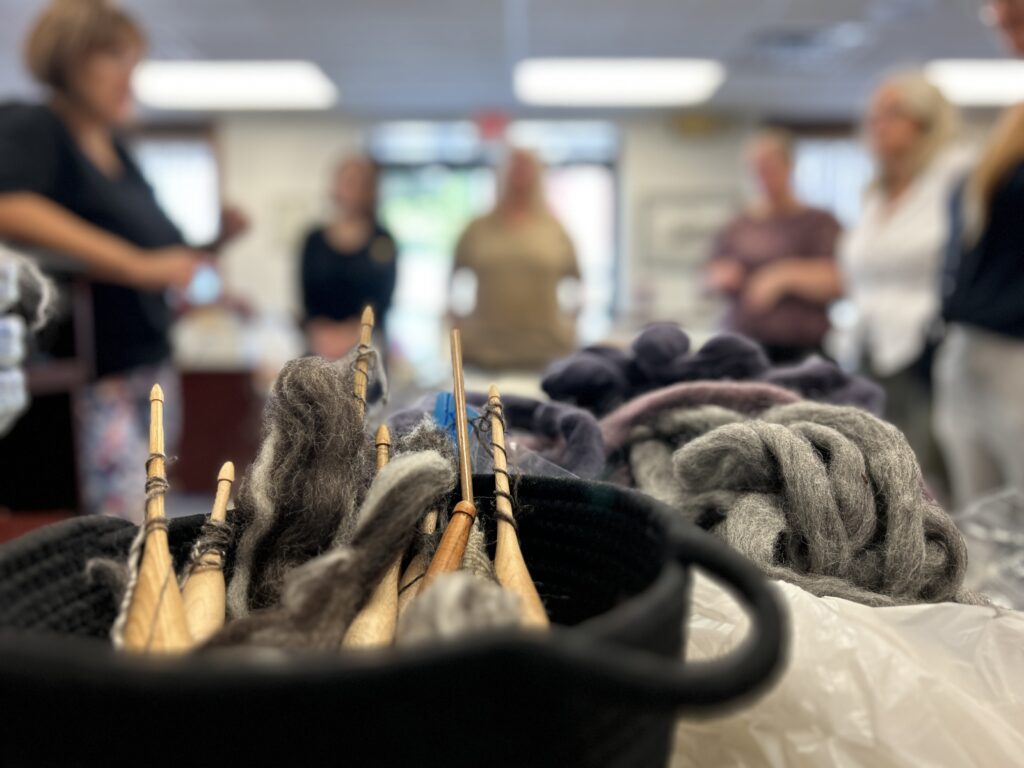
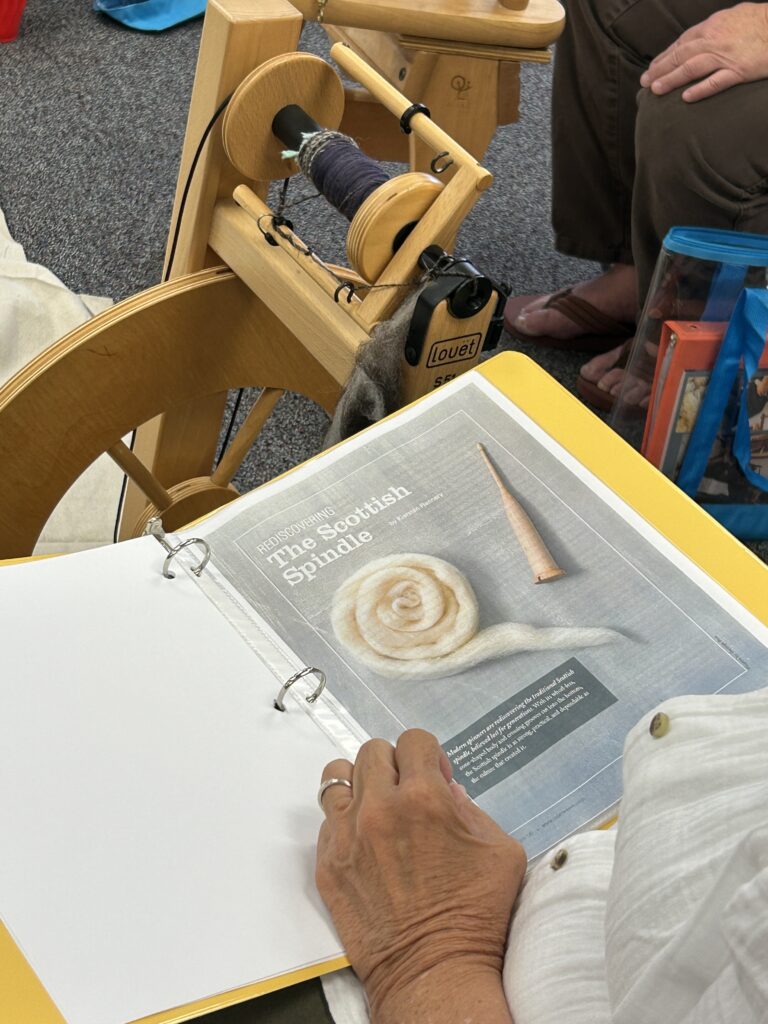
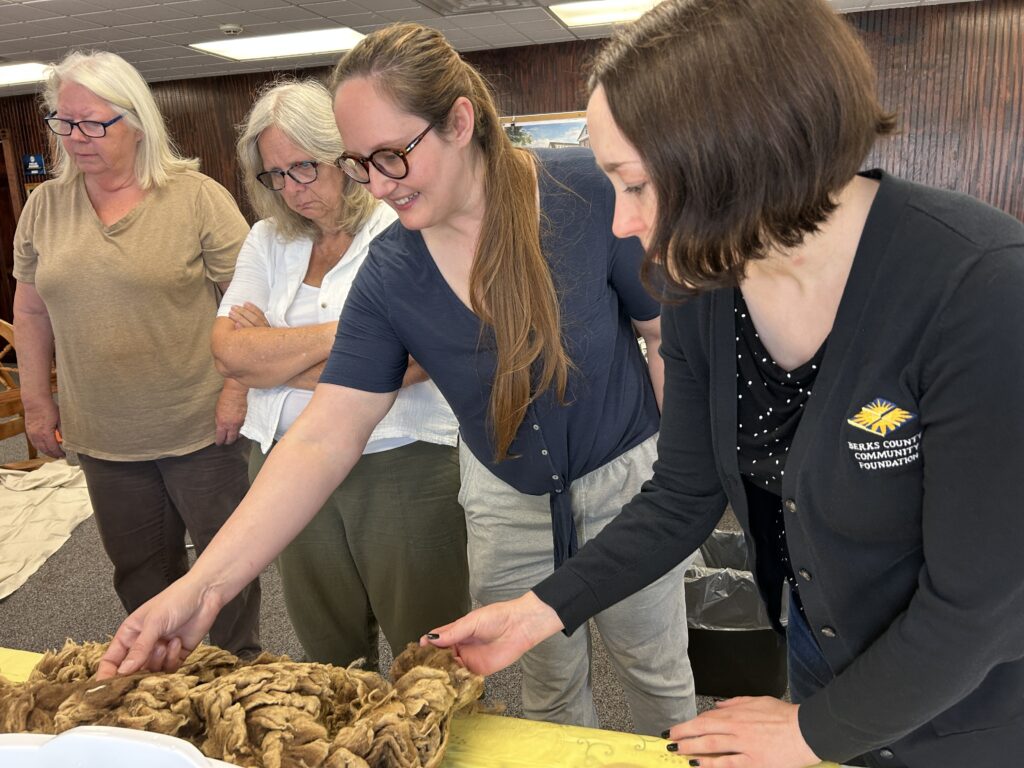
The recent workshop at SSPL began with a demonstration of how to properly wash wool from two different Scottish breeds of sheep. Each participant was encouraged to get their hands dirty for an authentic experience as they were reminded to stay mindful of water temperature to prevent felting of the wool. Participants then learned how to brush the clean wool to prepare it for the spinning wheel before actually attaching it. Then everyone had the chance to use a spinning wheel equipped with a Dealgan. During the workshop, participants also learned about historic Scottish sheep breeds and the efforts to conserve them.
This program was funded by the Juniper Fund of Berks County Community Foundation. The Juniper Fund of Berks County Community Foundation was established in 2010 by The Murray Clan Society of North America to support the education, promotion, and preservation of the history, heritage, and traditions of Scotland. Learn more about The Juniper Fund by clicking here.
Program attendees had access to spinning wheels, a spinning book for beginners, and fiber they could take home with them. The hope is that the class will inspire participants to keep this traditional craft alive. SSPL encourages crafters to stick with their projects by hosting craft nights every Wednesday from 5:30 pm – 7:00 pm. During these programs, attendees can ask follow-up questions, connect with one another, and continue working on their projects. Additionally, two spinning wheels are available to check out from SSPL’s “Library of Things” for individuals to try their hand at spinning from the comfort of their own home.
Whether you’re looking to learn a new skill, find a creative outlet, or simply connect with others, spinning offers a wonderful opportunity to weave new stories into the fabric of your life. For more information about programming at SSPL, please click here.
Exciting changes are on the horizon for the Reading Symphony Orchestra (RSO) as it welcomes a new executive director! This moment in the organization’s journey was celebrated on Thursday, September 19th at a welcome reception in our lobby at Third and Court. The event not only marked the beginning of a fresh chapter for the orchestra but also served as a networking opportunity for local leaders and community members.
Attendees included business leaders, philanthropists, and community advocates—all eager to connect and support the new executive director as he takes on this exciting journey.
The atmosphere was filled with the sound of laughter, lively conversation, and the buzz of possibility. Guests mingled, sharing their visions for the future of the RSO and exploring how they could collaborate to enrich the cultural fabric of Berks County. David brought Hershey’s Symphony Chocolate paired with two tickets to see the orchestra, doubling as a fun treat for guests.


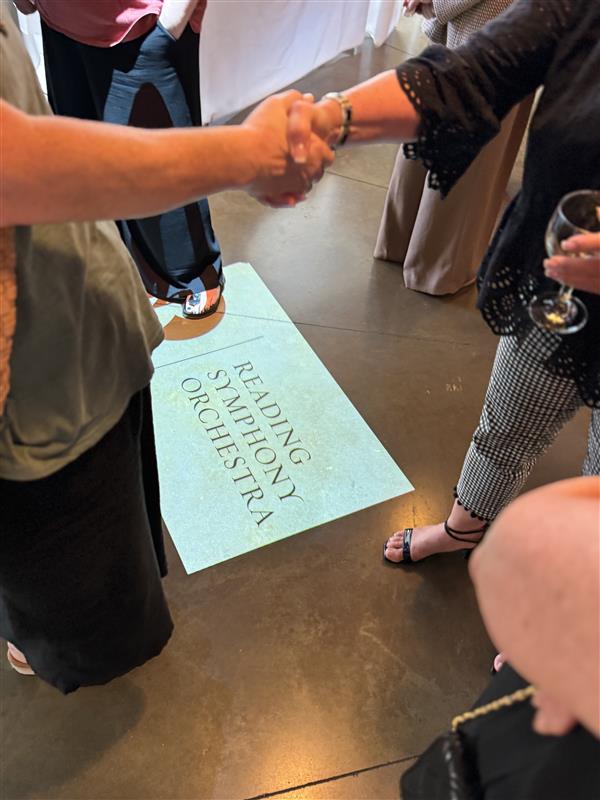
David says, “I am really grateful to be here at this time and to do this work with you. We are excited about the upcoming new season, and we hope it brings some air back into the arts because the arts are vital to the health and vitality of our community.”

Prior to David’s recent appointment, he served as president and CEO of ArtsinStark, a Stark County-wide arts council, in Canton, Ohio. Additionally, David served as the executive director for both the Asheville Symphony Orchestra in North Carolina and the Bangor Symphony Orchestra in Maine. During his time in Asheville, David developed and oversaw the implementation of several signature Asheville Symphony programs, including the Asheville Amadeus festival.
David also worked in Orange County, California, as an arts administrator with the Pacific Symphony, Laguna Beach Music Festival, and the Philharmonic Society. Read more about David’s bio originally published here.
If you couldn’t attend the welcome party, there are still plenty of ways to get involved with the Reading Symphony Orchestra. Whether through attending performances, volunteering, or becoming a member, your support is invaluable. Click here to learn more about RSO.
Here’s to a bright future for the Reading Symphony Orchestra, and to all the incredible opportunities that await in Berks County!
The “Attend, Achieve, and Be a Champ” program, funded by the Berks Initiative for School Attendance (BISA) Improvement Fund of Berks County Community Foundation, is focusing on student tardiness and attendance at Northeast Middle School.
Launched in early 2024, this program helps students who may have issues with punctuality. Natalie Smith, the program coordinator, states, “Students were chosen for the Attend, Achieve, and Be a Champ program based on their overall tardy rates. They were invited to the program when they were tardy at least twice per week and prioritized by their arrival time.”
On Wednesdays, students gather to learn about attendance laws, school policies, and practical tips for arriving on time. The program’s approach is multifaceted, focusing on education, personalized planning, and incentives. A key component of the program is the Attendance Improvement Plan. Natalie notes that this plan allowed each student to consider their own barriers to getting to school on time and improve their attendance. The students were expected to share the plan with their parents/guardians and return the plan to the school social workers.
The results have been encouraging. Natalie explains, “A total of seventy-seven students were invited to the program. Fifty-eight of those students invited attended the program, with an attendance rate of 75%. With the fifty-eight students attending the Tardy Program, there was a 31% improvement rate.”
Incentives played a crucial role in motivating students. The BISA Improvement Fund allowed the school to purchase various rewards, including bracelet-making kits, door basketball hoops, gift cards, and fidget toys. They even addressed specific barriers, stating, “We also purchased alarm clocks to be given to students who specifically stated that not having an alarm was a barrier to getting to school in time.”
The program didn’t stop at student engagement. Parents and guardians were brought into the loop, often learning about their child’s tardiness for the first time. As Natalie mentions, “Prior to each weekly program, we would contact the parents/guardians to gain their approval for students to participate in the program. This was also our opportunity to engage each family to inform them of the number of days students were tardy and any barriers that need to be addressed.”
The “Attend, Achieve, and Be a Champ” program is possible thanks to the BISA Attendance Improvement Fund of Berks County Community Foundation. This fund is dedicated to supporting initiatives at Berks County’s public schools that improve attendance.
Looking ahead to the 2024-25 school year, the team at Northeast Middle School is eager to build on their success. They plan to identify at-risk students earlier and provide more intensive support where needed. Natalie states, “Our goal for the school year will be to identify students with consistent tardies in the first thirty to sixty days (about two months) of school. We will enroll them in the afternoon program, and if attendance is not improved within ten school days, we will engage the students through case management, provided by the school social workers, and offer incentives.”
By tackling tardiness head-on, Northeast Middle School is setting its students up for success. If you have a program that can set up students for success, please apply for the BISA Attendance Improvement Fund. Click here to learn more about the fund and how you can apply.
Providing opportunities for nonprofit organizations to thrive is a big part of what we do at Berks County Community Foundation. One great example is the Nonprofit Management Certificate Program that the Foundation hosts in partnership with The Nonprofit Center at LaSalle University. This fall, join the Community Foundation and instructors from The Nonprofit Center at LaSalle University for a ten-month professional development opportunity designed exclusively for Berks County’s nonprofit executive directors and high-potential staff members who are serving in full-time, paid positions.
The program includes:
- Three group lunches at the Community Foundation.
- Six day-long in-person nonprofit management classes led by faculty members from The Nonprofit Center at LaSalle, all held at the Community Foundation’s office in Reading, breakfast and lunch provided.
- Three nonprofit management webinars led by faculty members from The Nonprofit Center at LaSalle, joined from your home or office.
This will be the third cohort of nonprofit executives to experience this program, which runs every other year.
Molly McCullough Robbins, Berks County Community Foundation’s Vice President for Philanthropic Services, was a member of the 2020 cohort while serving as Executive Director of Wyomissing Area Education Foundation. “Participating in this cohort was incredibly beneficial for me as a nonprofit leader. Not only did I learn valuable skills and best practices for the field, but I made connections with other nonprofit professionals in our community that I value to this day,” Molly said.
Applicants must be employed by a 501(c)(3) nonprofit organization in Berks County, Pennsylvania. The cohort is limited to 20 participants.
To receive the certificate at the end of the program, attendance of all nine classes is required.
Applications are open now, and the deadline to apply is July 22, 2024. Decisions will be made by August 9, 2024. The cost of the program is $500; scholarships or grants toward the cost are not available. Payments are due by August 30, 2024. Please click here for the full schedule.
*Note that Berks County Community Foundation is not an accredited educational institution, but rather a nonprofit that seeks to bring professional development opportunities to the community for local leaders.
Here is a summary of the curriculum for this professional development opportunity: Unless otherwise noted, these sessions will be in-person and 6 hours in length (9am-4pm).
Building the Board Your Organization Needs (bring a board member session)
If a board can make or break a nonprofit, what makes or breaks a nonprofit board? There are countless tales of triumph and terror on the topic of nonprofit boards and board members. With surprisingly few legal guidelines to follow, boards can look, feel, and function very differently from one another, even when they have the same assumed purpose. This class aims to explore what your nonprofit board’s role must be, what your board’s goals could be, and what it means for board members to be effective, both collectively and individually. Whether you are a long serving, aspiring, new, or simply curious board member, this course will give you a contextual view of nonprofit boards, governance, and a fresh look through an equity lens at the balance of power between boards, executive leadership, and the people and communities they impact.
Communication to Build Relationships, Engagement & Understanding
Communication is one of the most essential skills for individuals at every level of an
organization, from entry-level through senior management. As we learn to communicate more effectively, we create and maintain a more open and productive work environment. Effective communication can help enhance engagement, foster understanding, and build constructive relationships with co-workers, donors, volunteers, board members, and
supervisors/supervisees. This class will expand your understanding of communication and teach you how to put this knowledge into practice. You’ll learn about different communication styles and how you can communicate and work more effectively with others, including those who have different approaches to communication, are from a different generation, or are resistant to change/new ideas. We’ll also provide a framework for how to engage in difficult conversations to address challenges and pursue opportunities to improve your outcomes.
Effective Strategic Planning for Today’s Nonprofits (bring a board member session)
How does a nonprofit plan effectively during changing and uncertain times? In this class, you will learn modern approaches to strategic planning that will strengthen your nonprofit’s ability to pursue its mission in rapidly changing conditions. We’ll explore techniques for assessing your environment, gaining clarity on changing community needs, and developing strategies that can be adapted to meet new opportunities or challenges over time. This class will show you how to build a plan that will drive strategic thinking across your organization, helping your plan to stand up to unexpected changes both inside and outside your organization.
Fundamentals of Human Resources
Too few nonprofits have a dedicated human resource professional on staff. Yet, the minute you have a staff member, or are even thinking of hiring your first staff member, it is imperative that someone in the organization understands the essential human resource responsibilities, regulations, and laws. Because workplace laws guide and control much of what we must do with employees, this class covers the major workplace laws and the legal principles that govern the employment relationship. It will explore the importance of good policies and procedures in creating an effective working environment and introduce some of the most common and challenging HR responsibilities: the performance management cycle; development and management of compensation strategies; and effective guidelines for hiring the right people.
Understanding and Growing Leadership Capacity (online session, 9am-3pm)
Effective leadership doesn’t happen by chance or accident; it comes from thoughtfulness, intention, effort, and more. It is a journey, not a destination. Nor is it manifested in one form or in one personal style – it’s present in many. Leadership starts with the personal. Everyone loves to talk about their own or someone else’s “leadership style,” but the reality is if you have just one way to demonstrate leadership you will never be an effective leader. Effective leaders have a toolbox filled with styles and strategies for success. This class will take you through a series of reflective exercises to help you understand what leadership is—and what it is not—and where you see yourself as a leader—or not. Leadership is also a culture, and an abundant resource! This class will provide a tour of different approaches to leadership to help you identify the tools your organization needs to empower
leadership, at every level.
Basic Budgeting and Beyond (session is 3 hours, 9am-12pm)
Do you struggle to prepare your annual budget, lack 100% confidence in it when submitting it to the board, consistently approve it after the fiscal year begins and regularly have actual-to-budget results that you didn’t anticipate? Then this class is for you and your team. Budgeting is a complex, dynamic process that takes a team to effectively prepare, present and perform to. In this class you will learn the seven things you should do to create an annual budget and how to successfully fulfill its promise. From planning a process to presenting your budget, you’ll have it covered after attending Basic Budgeting and Beyond.
Financial Forecasting: Informed By the Past; Built for the Future (session is 3 hours, 1pm-4pm)
A strong financial management process is essential to a nonprofit’s well-being. In times of
concern and uncertainty about the economy and the prospects for funding, the ability to perform accurate and timely financial forecasting becomes indispensable. Day to day challenges, such as gift restrictions, adherence to mission, fixed and variable expenses, call for the skill to accurately forecast cash flow, while being adaptable to changing conditions. The result is a stronger and more resilient organization. This class will explore the basic inputs required to develop and evaluate financial projections for your organization. Understanding how and when resources are available to your organization will not only enable you to guide policy and programmatic decisions but also assist you in strategically planning your organization’s growth and sustainability.
For more information, please contact Kim Sheffer, Lifelong Learning Program Officer: kims@bccf.org.
On May 21st, 2024, Berks County Community Foundation welcomed students and their families, donors and scholarship fund representatives, and community leaders to our annual Scholarship Luncheon. Excitement filled the ballroom as we prepared to recognize the remarkable achievements of local students and the generosity of donors who enable higher education dreams.
This year, the Community Foundation will award nearly $737,000, bringing the total amount disbursed since its inception in 1994 to an outstanding $13,691,935. Thousands of recipients have benefitted from these scholarships over the years as they continue to pursue higher education.
Among the recipients recognized was Vanesa Aguay, who received both the Berks’ Best Taylor Seitzinger Award for Community Service & Leadership and the Berks’ Best Computer Science Award. Her parents were the first in their family to graduate high school and college after immigrating from Ecuador. They instilled in Vanesa a strong work ethic and a desire to give back. Vanesa shared, “I wouldn’t be where I am now without my parents.” She continued, “These scholarships have propelled me to pursue my dream of becoming an engineer.” Vanesa aims to develop technology that will help address disparities in health care.
The annual Scholarship Luncheon showcases the power of community support in shaping the futures of lifelong learners. Each scholarship awarded provides resources and motivation for students to carve out their paths, creating an impact in Berks County and beyond.
Another recipient, Tanesha Purohit, received a scholarship from the Wilson Scholarship Fund. This scholarship, created to support graduating students from Wilson High School in any form of post-secondary education, prioritizes well-rounded individuals who excel in academics, extracurricular activities, and community service. Gary Coller, representing the fund, stated, “It’s important to provide financial help to students as they start their educational journeys and give them access to the necessary experiences.”
Looking to make a difference in the lives of local students through educational support? Give to one of our many scholarship funds today!


